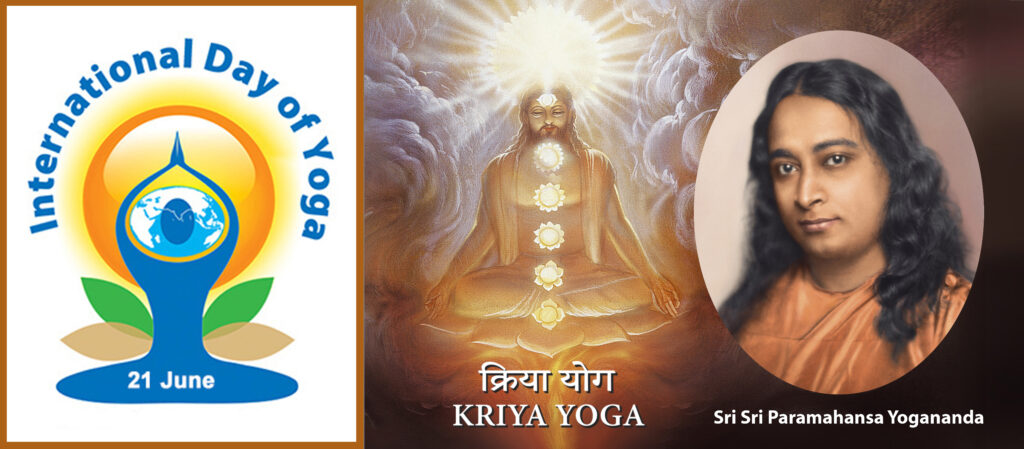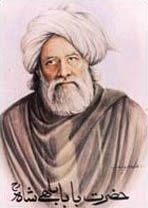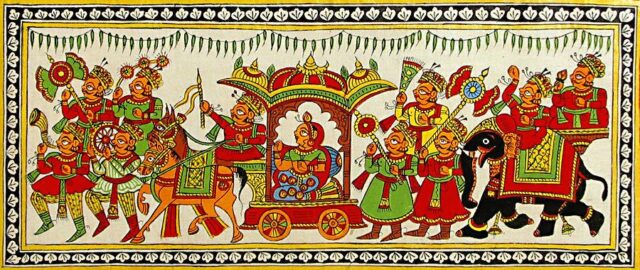Sarva Mangalam!
May all beings be enlightened!
WISDOM WINGING WITHIN
By
SURYAKANTHI TRIPATHI
Based on
1. CONFERENCE OF THE BIRDS by Fariduddin Attar
2. SRI RAMACHARITAMANASA of Goswami Tulsidas
and
3. BYA CHOS RIN-CHEN HPHREN-BA
The ancient Tibetan text
‘Lord Buddha’s Religion for the Birds’
WISDOM WINGING WITHIN
FIVE SCENES
I. TAKING WING TO THE KING
II. THE TEACHING OF BHAKTI
III. THE SEED OF DHARMA
IV. THE INNER RESOLVE
V. A WINGED SYMPHONY
*********
I. TAKING WING TO THE KING
The King kneaded clay with water and with air.
Next, with a vial of spirit, vivified its every pore.
He gave it intelligence that the clay may discern,
Then He Himself seeped through it all as longing,
And trapped the clay yearning in a forever enigma,
Of body-soul interlace, this restless mortal mixture.
But, about that, they say, it’s better to keep silent.
We will. But first we’ll tell of winging to the King!
Travel with us, the journey is but the destination,
And after we reach, then, we will keep silent.
Human and bird, we have each an intellect adamant,
But need a guide delving deeper than can our mind!
We want the King, who made manifest you and me,
The One who floats cosmos on a sliver of His will,
Who, in a turtle shell’s speckle, could conceal infinity!
But who’ll lead us to Him, is there any one that can
Wing us to the King who baits us silently, eternally?
Yes, it’s Hoopoe, a feather fan as its crown spray,
Yes, that bird, its small breast blazes the Spirit’s way!
We know nothing of the King, save that He exists,
Can you take us to Him, the birds asked Hoopoe.
Yes, said Hoopoe, for our deluded, unseeing self
Is blind to the King’s royal road right before us.
It is here and far, near and distant, His throne,
Let us together end our quest, not do it alone,
Give up oneself, for the whole is our only goal,
For the King, He waits to give us his inmost soul.
Nothing can words say, let us go seek the way!
Truly, Bismillah is etched deep on Hoopoe’s beak,
So praised the birds, but reverted and found excuse,
Nightingale could not part from his love, the rose,
Peacock, painted bird, sought just his lost paradise,
Duck said, my pond, it is the prayer-mat of perfection,
Why, asked Hawk, I already perch on a royal wrist,
So also said no Finch, Owl, Hen, Homa and Heron,
But all, incoherent and lame, did voice only their fear.
But Hoopoe urged, Truth is not pale, but brightest light,
The heart craves the sun’s fire, let us fly to the flame!
II. THE TEACHING OF BHAKTI
Uma Bhavani, power of nature, nature of energy,
She asked Shiva Mahadeva, the omniscient yogi,
Of all, you know best the majesty of Lord Rama,
But why did you first tell the story of Lord Rama
Of all, tell it first to the old crow, Kak Bhushundi?
Shiva Omkara, the ever-present essence, replied:
Few are they, who truly grasp the story of Hari,
Again, fewer that can truly tell the story of Hari.
None as rapt in one, adept in other as Bhushundi!
Only in such submersion, does all delusion flee,
For, well do we all know, Uma Bhavani,
Many drapes of delusion does He don, our Hari!
In the Nilagiri risings of the four golden peaks
There dwells, Kak Bhushundi, immortal crow,
Aeon after aeon, immersed in Hari Bhakti!
On one peak stands a banyan, peepul on another
A Plaksa fig tree the next, mango on the fourth.
Witness and compass of Kak’s daily devotion.
He meditates on the Lord under the peepul,
Chants His name below the arc of the Plaksa,
Worships Him in the shade of the mango,
And narrates His tales under the Banyan.
Waves of birds flock each dawn to him,
As did I, along with noble, enlightened swans,
For Kak Bhushundi, in the trance of total devotion,
Tells without pause, the myriad tales of his Lord,
Incarnation of Hari, eternal incomparable Rama!
Now I’ll tell you about Garuda, whom you know,
This king of the birds, how he called on the crow!
Garuda, the mount of Vishnu, of Hari himself,
Even he was ripped by doubt, rent by delusion,
And had to hear Kak tell the story of his Hari,
The Blessed Lord of Illusion, Bhagavan Mayapati!
Raghupati, playing at fighting a battle in Lanka,
Allowed Himself to be prone, hand and foot bound
By the slew of snakes flung at Him by Meghnath,
That mighty warrior son of the mightier Ravana.
Then Narada, heavenly sage, to Lanka sent Garuda,
To cut the serpentine bonds and free Rama, Lord Hari!
Garuda, king of the feathered creation, he did his duty,
Freed the Lord, bound on ground by venomous ropes.
But he returned, his soul sad, in grievous dejection!
Garuda agonized, My Lord, now incarnate on earth,
How did He get flung down, get so easily coil-bound?
Hari, the Rama, just the repetition of whose name
Frees one from the tangled bonds of life and death,
How was He helpless, so shorn of His own divinity?
O Uma Bhavani, then did Garuda come to me,
Unsure of himself, knowing dimmed and dark,
Perplexed and in pain, fallen prey to confusion.
Changing and unreal, Maya makes puppets of all,
Formidable is this Rama’s power of cosmic illusion,
A challenge to decipher the nature of His reality.
Even Garuda, so close to Hari, was by Maya misled,
Then, can mere mortals attain immunity from fantasy?
Yes, yes, only when each instant is with devotion filled,
When every breath, in out, is of love the most intense,
Else despite sacrament, sacrifice, ritual or austerity,
Rama Raghunatha stays distant, is not drawn near!
With a host of sages, asked Uma, why did Garuda,
Go to hear a crow tell the story of Ramachandra?
Shiva Mahesha replied, Bhushundi, great devotee,
Says just Raghupati’s name is radiant as the sun,
Dispels all the darkness, ignorance and illusion,
For Rama is Truth and Bliss, He’s Cognizance!
Garuda, I said, seek solace in Kak’s company.
At this, even that wise, ancient bird of wide span,
He looked down, then at me, in some perplexity.
A crow, my Lord, he said humbly, forgive me!
Immersed in your meditation, Shiva Ishwara,
Perhaps, perhaps you did not hear me clear.
Kak Bhushundi’s life, it is steeped in wisdom,
Is freed from the taints of worldly attraction,
So go, O King of the Birds, I said, go there,
Where the story of the Lord is told ceaselessly!
The Adi Ramayana, the Rama Charita Manasa,
Manasa, the Lake brimming with Hari’s eternity!
Even as you hear it, your doubts will all dissolve,
Intense again will be your love for the Lord!
Then did Garuda fly to the abode of Bhushundi.
At the very sight of the peaks, his heart grew light,
As he drank the water of the lake, his agony faded.
Then delighted, he betook himself to the banyan,
The flocks of birds were there, all gathered to hear
The crow’s narration of Rama’s divine incarnation!
Kak seeing Garuda, saluted him with great respect,
Tell me, King of Birds, what would you bid me do?
Garuda said, you are the cast and core of sanctity,
At the sight of your hermitage, all qualms vanish,
Now, I yearn to hear you tell the sacred Rama story,
That enchants at its hearing, still keeps one longing!
At this pious request, Bhushundi, diffused with joy,
Sang of the Lord’s descent, his epic deeds on earth,
The mystical Manasa, sacred lake of Rama’s exploits!
The birds said, Ayodhya Rama is bliss incarnate,
And Kak Bhushundi brings the Lord within our reach
By his rapturous recounting of the Rama Charita!
Garuda, he bowed low before the crow and said,
When I saw His ways were those of a frail human,
I was in deep distress, but that was a blessing,
For it led me to you, Sir, to a divine opportunity
To hear your sacred narrative of Rama Sri Hari!
By His grace, freed of angst am I, blessed am I!
For no chant or vision can match your devotion!
Such was Garuda’s pilgrimage to Kak Bhushundi,
In those mystic, enraptured purples of Nilagiri,
North of Mount Sumeru, which the sun circles,
To again learn true Bhakti for his own Lord Hari!
And so it was, that Garuda went and he learnt,
Property, progeny, position, retinue of illusions,
Not the moon, starry hosts or mountains afire,
But only His sun can make dark despair disappear.
True devotion, free of bigotry, leads to Lord Hari,
Who wants no mind-control, penance or penitence.
For the Rama of the Raghus is found only in Bhakti.
Even in an age of chains, free are we to stride space,
Through constancy to Rama, in adoration of Sri Hari!
No longer circled by serpents of desire or vanity,
Our world brimming over with Rama’s compassion,
Against whom do you need harbour fear or animosity?
Grant me these blessings, Lord Rama, in Your mercy,
May I never yield to Maya, test of distracting potency,
May my love for Your lotus feet be intense, my Lord,
In every moment, in every breath and birth of mine!
Then, ended Shiva Mahayogi,
In this, did all birds find bliss!
III. THE SEED OF DHARMA
The Lord Buddha said,
In every tongue will I expound Dharma,
In the speech of angels and serpents,
In the tongues of humans and birds
So that every being may drench,
In the outpouring of the Dharma.
Thence, The Buddha, he entered
And breathed in the realms of all life.
In the seclusion of the mystic Himalayas,
Where summits shine in bright radiance,
And glaciers wear lion-manes of turquoise,
In the wooded mountain of Unique Jewels
Under a sandal tree, in a perfect trance,
Sat still, for ages, the noble Lord Avalokita.
Sat he, becoming a Cuckoo, King of Birds,
Sat he, absorbed in the total presence.
Then, one day, just as the sun rose,
The Parrot made bold to speak to him,
Salutations, Great Bird, please awaken!
Do emerge from your deep trance!
At last, Lord Avalokita did open his eyes.
Then, insisted the Parrot, Eat, great sage!
Since you too are a bird, I brought seeds,
The quintessence of all food and life.
And, thereafter, O Most Wise One, tell me,
Do tell what merits such contemplation?
The Cuckoo looked deep at the Parrot and spoke,
Samsara, this ocean, is vast and restless,
Yields not one drop that is of substance.
Koo! Koo! Kooooo!
Parents and children, friends and enemies
Robes and rags, strongholds and huts,
Hoarded spoils, even rocks get consumed.
Only impermanence and illusion,
As the truths of Samsara, do abide.
This I learnt, in solitude and silence,
In fragrance afloat under this sandal.
Hearing this, the Parrot called out
To all the feathered creatures.
They came, birds of every kind,
Indian birds led by the Peacock,
Birds of Tibet behind the Vulture,
The water birds followed the Goose,
Domestic birds, the red-breasted Cock.
They settled in rows, saluted the Cuckoo,
Give us the good Dharma, they said,
Free us from this cage of suffering;
Give us the good Dharma, they said,
Dispel the ignorance in us.
Great and noble bird, the Parrot said,
We are all deluded by Samsara,
Give us the good Dharma, the Saddharma!
That we may ponder on it, know it!
Thrice, the Great Bird shook his wings,
Koo! Koo! Koooo!
That’s a mighty entreaty, so I will speak.
Listen, said the Cuckoo, there are just three,
Three treasures to attain the sole refuge,
In this life, as also in all life hereafter.
First, said he, Reflect, in earnest reflect,
On life’s impermanence and on death! Koo!
Second, Commit kindly acts, never an evil one, Koo!
Third, Allow within only thoughts good and benign.
Koooo!
Rose the Peacock, framed by a fan of splendour
Kog Go! Kog go! Yours is the loss! Yours is the loss!
Without Dharma, yours is the loss of the Buddha!
If you do not give, yours is the loss of possession!
If you disbelieve, yours is the loss of all blessing!
Then, the Master Parrot, skilled in speech, said
Dwell in samsara, you lose, for you lose yourself!
Said the Brahminy Duck, of velvet plumes,
Os Gtor! Os Gtor! Do without! Do Without!
In the world of Samsara, do without bliss!
With no compassion, do without blessings!
With no Dharma, do without deliverance!
The Great Cuckoo spoke to the winged assembly,
Again after a week, then after a year.
The red-beaked thrush, it rose and said,
Bcud loh! Bcud lon! Profit from! Profit from!
Profit from your possessions, give them all away!
Profit from pure doctrine, choose a lowly place!
Profit from discontent, withdraw from samsara!
Profit from Buddha, awaken to absolute essence!
The Master Parrot, skilled in speech, said
Profit from the holy Dharma, find yourself!
Thus spoke many birds, but some stayed silent,
For still unsure were they, in doubt, in angst,
If samsara is unreal, they wondered perplexed,
At this instant, are we real, is this assembly real?
Is then this teaching itself unreal, our listening unreal?
The Great Cuckoo nodded, and said,
You wonder right, you intuit right!
All assembled here, this assembly itself is a dream
All birth is dream-birth, all death a dream-death,
It’s all a drift, even the drift itself a dream-drift.
So are all the Buddhas but dream-Buddhas,
Koo! Koo! Koooo!
Transient is everything, just a gust of air,
The echo of a bird-call across a valley,
This blue-green tapestry of a cloud,
Meditate on this mist which is illusion,
And, thereby, thirst to grasp the truth.
Only perfect truth is not unreal,
Knowing oneself by oneself!
Salvation through Absolute Thought.
Bestows the highest wisdom, the Dharma!
And the absolute mind of Dharma,
Holds only compassion and enlightenment,
Compassion for all beings,
And enlightenment that seeks to impart, in turn,
Compassion and enlightenment to all!
So that each living being gains both,
As that twin wave of Dharma rides ahead!
Hence, added the Cuckoo, the Great Bird,
Seek the infinite, abiding life-essence,
For only in compassion, in law of karma,
In the knowledge of the Good Dharma,
Is there truth, is there permanence,
As real as the impermanence of Samsara!
This, then, is the seed of knowing,
Quintessence of action and life,
Act ever for others, if you desire peace,
It is an easy song of harmony, sing it!,
Complex is samsara! Simple is Dharma!
Koo! Koo! Koooo!
The Master Parrot saluted the Great Bird,
Lord Avalokita, Lord of the permanent realm!
Profound and true is your lesson,
And, when a bird such as you teaches it,
Then the lesson flies deep, it flies light,
For such a lesson lives to wing, wing far!
All the birds sang, wishing others abounding joy.
Danced, wishing others abounding Dharma.
Then, they slept under the tree of fragrance.
When, at dawn, the sun rose over Jambudvipa,
That we call the land of insight, land of India,
The birds, they all circled thrice the tree,
Where they had received the Good Dharma,
Then, on wings of light, flew to their dwellings.
There to impart, in turn, the Good Dharma.
And, instantly, the Cuckoo, the Great Bird,
Entered once again into a perfect trance.
IV. THE INNER RESOLVE
The birds set forth in thousands unease-suppressed,
Inspired by Hoopoe, persuaded, curiosity-piqued,
Wings feathered space, will turned into waves.
Every blue and the sun-fed, red-ochre
Witnessed spans of sails in awe and wonder
Across skies and horizons, began journey to a King,
Mysterious that King, who caused such longing!
The birds flew over mountain peaks and passes,
They flew, they flew, led by promise of Hoopoe,
Who urged them to fly, to rise and to soar.
Then, in valleys, they would alight to pause.
But valleys do dilute the resolve of many!
The faint said No Further, the tired folded wings.
But many are valleys to cross for one to rise high,
Seven on the journey to Kaf, the King’s pavilion,
The valleys of Quest, Love and Understanding
Of Detachment, Unity, Amazement and Death.
The Valley Of Quest
The Valley of Quest says, Become Empty,
Make space for winds to blow through you,
Give up needs, even of love, of respect,
Jettison all, own nothing, journey on alone,
Till dogma, doctrine, belief, unbelief all vanish.
Questing out will not reveal the one passage,
Quest for it, that which is so near, so within,
To know that there is one door never shut
Where burns the pure lamp of the one Majesty!
The Valley Of Love
After long, distant flight was the next valley,
The Valley of Love, said Hoopoe, is flaming fire,
Flee not, become the eager fuel of this pyre,
Plunge burning, unbridled, to your blazing end,
Love feeds on flames, not the smoke of reason,
Reason and love, each considers other a folly,
But reason, not love, is blind to inner sight,
Approach that one door, others lead nowhere,
If truly you burn, your embers will hear, “Enter”
The Valley Of Understanding
Birds, yet of endurance, began their flight again,
Winging once more for long years, till, said Hoopoe,
Let us pause, here is the Valley of Understanding!
Of extent beyond reckoning, no end, no beginning.
Granting jewels of insight to every explorer,
With slender butterfly perfection or hurricane force.
Discard the petrified mind, in atoms see the whole,
Our paths differ; each takes a preferred route,
One in a mosque, before a deity, or just inward,
But when the sun rises and lights up the land,
The seeker is a pilgrim welcome everywhere!
Perception is full when you truly watch you,
Look with your longing, till your self recedes,
Look till all you can see is an immortal Friend!
Seas of gnosis, Truth’s mysteries are infinite,
Even at God’s throne, implore, Is there more?
Can I still submit to the Way and know more?
The Valley Of Detachment
Here, in the fourth, the Valley of Detachment,
All desire expires, lust for meaning disappears,
New and old, all existence but a moment’s mirage,
Worlds as sand grains, stars spilling are leaves falling,
Planets fade as sparks, dust, not paradise, is Heaven’s arc!
All that is not given is lost, that not given up imprisons us.
At the Throne, all that is, will be and has been, exists not.
Devastated is totality of sense, space and substance,
Hence, ponder on the drop from which all is formed.
This valley is limitless, halt if you wish to petrify,
Advance, but all you’ll hear is Further! Go yet further!
In this valley, learn acceptance and thankfulness,
Discard the thinking self, be one to clasp and grasp!
Passive in the aura of Truth, active in comprehending it!
The Valley Of Unity
It’s a mysterious valley of one, everything else naught,
Every number is one or repetitions of that single one.
Many or few on its road, all become one element here.
The scorpion asleep within will awaken as hundred dragons,
If you connect to temporary glory, you do to disappointment,
Happiness is the core within you, not the ornament on you.
If you see many here or only a few, they are but one,
No matter how many appear, unit and number are gone,
There is neither Ka’aba nor Pagoda, see nothing not Him!
We are in Him, by Him, with Him, sun of single essence!
Where shall I prostrate? I, but a melted ray of that sun.
I know not if Thou art I or I am Thou, duality un-found.
After Truth’s melody, I crave not eternity, only Unity.
Just as an old woman gave a sheikh a piece of gold,
Which he refused, saying, I accept things only from God.
And, she asked him, “Where did you learn to see double?”
The Valley Of Amazement
I am the flame that’s frozen, ice that’s torched,
After my experience of Unity, where is the whole?
I’m in love, it is with Him! But I don't know Him!
Am I drunk or sober, will I stray thus forever?
Soul shredded, heart weeping, love-filled but empty.
I’m bewildered, unsure even of doubt, no road left!
The face of perfection in the sun, was it a fantasy?
Now I’m mute even as I speak, blind even as I see!
Hundred hills lesser than an instant of this uncertainty!
The Hoopoe said, Take heart! Your grief will rain mercy.
Even your bewilderment has its purpose in this Valley,
Important and unimportant, here, do not exist,
Nothing is trivial, but is witness of divine wisdom,
An ant holds His grace, nothing is superior to nothing,
A man was crying out, he had lost his key,
The Sufi said, I have neither the door nor the key!
Search for both, for all, perfume of the big and small,
Remain amazed, then you’re ready for the next valley!
The Valley Of Death
Here all that’s lost is found again, that’s the deep mystery
You rediscover anew, become one, both here and not here,
Not being separate is beauty, for you exist, you exist not.
One moth circled the candle flame, another embraced it,
Flame-wrapped, burning red, of the candle it then knew
That a thousand shadows can disappear in a ray of light!
Deny dignity, seek obscurity, find death then immortality.
If you yearn to truly arrive, fearless, put aside the self,
What use is your I when you’ll disappear with not a trace?
Annihilate yourself, outsoar all desire of this mortal cavern,
If you’re are a pilgrim of no identity, then unfailing alchemy
Takes you to empty, to eternity, frees you to be as God!
Your prayer heard since you burnt reason, gave in to folly!
The ocean of beautiful pearls will then seek you, the drop,
Be the drop swallowed by the ocean and know its secret,
The drop becomes infinite, sees the hidden truth all seek,
In the ardent wooing of the fire by the light-bright moth!
The Destination Is The ‘I’
At last, swirl after surge after wave, curtains parted,
After a journey arduous, despairing and triumphant,
A journey that bestowed luminous humility and clarity,
The thirty birds, in single quest, reached the King!
Finally, finally they reached the abode of the Sovereign!
But there, no great King was, but they themselves.
They saw each other, and each of them was Simorgh,
Simorgh, the King, was each of them, all of them!
Shedding all, small enough to see own greatness,
They knew the King now as inner truth and witness,
The journey itself was salvation, it was the destination!
Were you there, Simorgh, were you who we were?
At our journey’s start as you are at its end?
There, with us, as we traversed the seven valleys?
Were you us, perhaps, even before we started,
Were you us, wondering where to look for a King?
The nameless one, possessed of greatest meaning?
I am the thirty birds that have come here
I would be forty if that many had reached.
Also am I the thousands that will set forth,
As the thousands remaining in own environs,
Each soul-bird consumed by hundred sorrows.
A bird is bound tight by two, me and the sky,
O bird! Be free! Be chained only to the I!
I am closer to you than your very veins
But you have travelled so far from you,
When all your roads get lost, you’ll find me,
It’s a journey only as long as you make it,
But each will cover the distance, eventually,
To find me that is you, inside of you that is me!
V. FINALE — A WINGED SYMPHONY
A bird is a being of winged learning,
A lithe accent of the heights of earth,
The water, the land and tree heights,
The heights of forest, peak and sky.
It is the soul-bird in our heart flights,
All singing in our silence an eternal trilogy
Of Devotion, Compassion and Oneness!
You drench in this mystic fount of life,
When flocks of immortal birds each day,
Soar together to sing their symphony,
An infinite concert of the radiant truth.
They awaken us at many dawns of the day,
Many voices, one harmony, Fly to the I,
The ‘I’ of Tawheed, of Dharma, of Bhakti!
This is the telling of the King and His clay
By the Crow, the Cuckoo and the Hoopoe.
Lost in the King, from vain debate be free!
Lost in the King, from your own self be free!
We will all tell this telling again and yet again,
As will you, who now can also tell the telling.
And all, till we tell the telling, we’ll keep silent.
******






